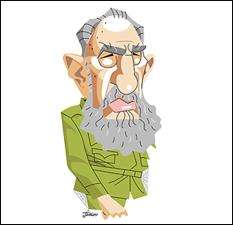Photos / Luis Felipe Rojas
The Alianza Democrática Oriental (Eastern Democratic Alliance) energetically condemns the imminent arrests under a prosecution devoid of legal guarantees of five brave activists from Eastern Cuba.
Néstor and Rolando Rodríguez Lobaina, Enyor Díaz Allen, Francisco Luis Manzanet Ortíz and Roberto González Pelegrín received non-written communication, that is, only verbally from the secret police, that they would be prosecuted for the supposed crime of public disorder, an action they did not commit at any time and which was actually carried out by the police in Baracoa themselves.
This story surpasses the recent incident of 11 August, when Yordi García Fournier and Heriberto Liranza went to Baracoa to attend a session of the Foro Juvenil Cubano (Cuban Youth Forum), along with other activists and residents. Immediately, the police detained García and Liranza and decided, without cause, to expel them from town; they were then notified that they were under ‘deportees’ status and, by order of the high command, were barred from returning to Baracoa. Their friends who witnessed the incident reacted without hesitation and demanded an explanation as to why the police themselves were violating citizens’ rights to move throughout the country and to meet with whomever they choose. The response once again was, ‘you can’t come back here.’
The only method available to Cubans facing injustice is to protest in a peaceful manner, chant slogans, or display banners with demands, even if later they’re worked over by a good beating or thrown in jail. That’s what the remaining activists did, only this time not in broad daylight nor in groups along the main avenue. They went to Néstor’s and Rolando’s house and from the balcony of the third floor they displayed banners that demanded freedom of mobility, they chanted slogans such as ‘Long live human rights!’ and ‘Orlando Zapata was murdered!’ The trained mob soon appeared. From the ground-floor entrance of the building, kids, elderly, men and women in a tight crowd chanted slogans of praise for some guy named Fidel and some other guy named Raúl and said that the streets belonged to those two. No policeman made a single arrest, nor scolded the mob that, from the groundfloor of the building threw stones and bottles, shattering apartment windows.
There was a nighttime pause on the 11th but daybreak on the 12th was more turbulent.
The protest activities from above and the aggressions from below continued. Later came the detentions. From the third floor the police brought down, in handcuffs, the five men who remained up there. They raided a residence where a young girl, a pregnant woman, and an elderly woman had witnessed the entire spectacle and from which they were expelled for the 12 hours the police took to search the home. They took whatever objects they pleased, including cell phones.
As those who know well the brutality of the Cuban police can attest, the five activists were the victims of a disturbance brought about by the mobs at the service of the National Revolutionary Police in Baracoa and yet they are the accused. International public opinion has been informed, as have organizations that monitor human rights on the island been informed that the judicial prosecution will be carried out against the five for the crime of “public disorder.” All this, after a brutal wave of repression was conducted in the eastern region of the country between July and well into August resulting in more than 50 detentions and a fierce smear campaign by the government against the Alliance’s platform.
The possible sentencing of the five dissidents from Guantánamo confirms yet again the double standard policy assiduously practiced by the government as part of its greater foreign policy. On one hand they release some dissidents from prison, on the other those who attempt to say ‘I disagree’ get shoved behind bars.
Translated by: Yoyi el Monaguillo
August 24, 2010


 Fidel Castro in Parliament, for the first time in four years
Fidel Castro in Parliament, for the first time in four years